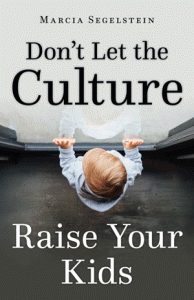Don’t Let the Culture Raise Your Kids
by Marcia Segelstein
 On the cover of Don’t Let the Culture Raise Your Kids by Marcia Segelstein, we see a child looking out a window with both hands pressed against the glass. Is this book about isolating your child from the world? Not at all. It is a book about what Christian parents can do to maintain their beliefs and values in a world that continually bombards children and their families with harmful influences.
On the cover of Don’t Let the Culture Raise Your Kids by Marcia Segelstein, we see a child looking out a window with both hands pressed against the glass. Is this book about isolating your child from the world? Not at all. It is a book about what Christian parents can do to maintain their beliefs and values in a world that continually bombards children and their families with harmful influences.
Before becoming a mother herself, Marcia Segelstein covered family issues for CBS News. She took up writing from home about family concerns, eventually becoming a columnist and a senior editor for Salvo magazine. She has written for FoxNews.com, First Things, WORLD Magazine, and Touchstone. Segelstein says that from the time she grew up to the time of raising her own children (both of whom are now in their twenties), the culture shifted from one that might not have been explicitly Christian to one that actively works against Christian morals and values. She wants to share what she has learned about the pervasive influence of the culture on the family and to show adults how to be the parents their children need.
The book first explains the critical role of parents. Children need parents to be authority figures, yet modern parents have been abdicating that role. Permissive parenting, in the name of fostering children’s happiness, self-esteem, and creativity, has produced entitled, disrespectful, and demanding children. Authoritative parenting is not authoritarian or mean; it is a loving, nurturing, consistent, standard-setting style of parenting. Saying “no” does not stifle a child’s creativity but rather fosters problem-solving. Confident, authoritative parents inspire children to follow their lead.
Subsequent chapters address prominent examples of how the culture introduces concepts that contradict Christian values, especially regarding schools, media, sex, pornography, and consumerism. For every issue, the author gives multiple real-life examples of the incursion of unwanted ideologies and morals on our children. Some instances might have gone unnoticed or unconsidered by readers and will provoke further thinking. Some could elicit astonishment and chagrin. Readers might be all too familiar with other examples and feel at a loss for how to respond. But Segelstein never leaves readers stranded.
Through this book Segelstein offers parents ways to counteract bad cultural influences in healthy, constructive ways. A sizable part of every chapter is “Solutions, Tips, & Tools” that are practical, specific ways for parents to exercise responsibility. Already in the first chapter, on parenting, the author quotes a founding member of the American College of Pediatricians that “it’s never to late to start,” and goes on to tell how to begin anew with even a school-age child. Tips and tools range from setting reasonable rules and discipline methods through establishing rituals, family meals, vacations, and respect, to writing a family mission statement. Tips for issue-oriented chapters are equally down-to-earth and easily manageable. In some cases, specific tools are recommended such as guides to video games and electronic device filters.
Even the author’s final thoughts chapter, about living according to one’s beliefs, offers tips that begin with where to get help for the parent who feels overwhelmed. Segelstein recommends praying together, going to church together, and church involvement, among other suggestions.
Everything in Don’t Let the Culture Raise Your Kids is amply supported by research and expert opinion, with 268 citations at the back of the book. A resources appendix list recommends books and websites.
About the Reviewer
Mary Ann Paulukonis is a wife, mother and grandmother whose life also includes artistic pursuits, writing, and ministry consulting.




